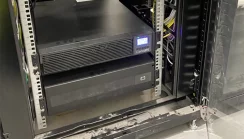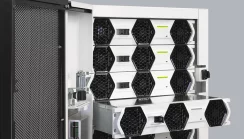Choosing UPS Systems for Industry 4.0 Applications
Industry 4.0 is driving the development of micro data centres, uninterruptible power supplies and environmental monitoring systems. Sometimes referred to as the Forth Industrial Revolution (4IR), industry 4.0 applications require a stable electrical supply for seamless process control, interconnectivity, data collection and smart factory automation.
What is Industry 4.0?
Industry 4.0 refers to the technologies and processes that smart manufacturing industries are integrating into their production processes. A wide adoption of digital technologies and production methods. The aim being to achieve more flexible manufacturing, lower costs and improved efficiency; especially energy efficiency.
To adopt industry 4.0 automation and control, IT site managers and engineers must consider a wide range of related subjects including not just industrial automation, but advanced robotics, predictive maintenance, augmented reality, and cyber security. All these technologies require a stable and uninterruptible electrical power supply.
More information: https://openindustry4.com/
Rack Mounted UPS for Micro Data Centres
Edge computing within industrial complexes takes data collection and processing as near as possible to the manufacturing processes. This can lead to the placement of micro data centres within an industrial complex, in place of a central server room or data centre.
A micro data centre is a system based around a 19inch server cabinet and is a form of portable server room or mini data centre. The cabinet houses all the critical infrastructure required including rack mount UPS systems, a form of cooling/air conditioning, fire suppression, environmental monitoring, connectivity, and cable management. A critical infrastructure system into which Industry 4.0 IT servers (3-4 for example), network peripherals and automation and control solutions can be installed.
APC by Schneider micro data centres are one of the most popular micro data centres as the company has its own branded solutions across the critical infrastructure landscape. Otherwise systems integrators such as Server Room Environments, can put together their own micro data centres using preferred brand solutions, all integrated into a single ‘plug-and play’ cabinet, including environmental monitoring.
Centralised UPS within an Industrial Control Server Room or Data Centre
For some industrial sites, there may be more one or more server rooms, and these may have their own dedicated uninterruptible power supplies, with site-wide backup power generation to support the facility during a prolonged power outage.
Industrial UPS Systems
Whilst the view may be that industry 4.0 manufacturing sites may be high technology sites with clean-room type environments, the reality is that some 4IR sites present harsh environments. For such sites a far more robust industrial UPS system is required, than one for a typical IT environment.
Industrial UPS systems are specially designed for harsh environments, with uprated components to withstand higher ambient temperatures, transformer-based rectifiers offering Galvanic isolation and may be fitted with fans with redundancy, filters for dust, harmonic filters, additional surge and lightning protection, higher IP-rated cabinets (IP54 compared to the standard IP20) and sat on anti-vibration mounts and plinths. Industrial UPS can be built for specific applications including oil & refinery and to specific standards for the water industry i.e., WIMES 3.07, a specific standard for the UK water industry.
Industrial UPS for harsh environments tend to cost 25-30% more than an IT UPS and are made-to-order with long lead times. Typical manufacturers include AEG Power Solutions, Borri UPS, Eaton, and Schneider.
Industrial UPS System Characteristics
Whether an uninterruptible power supply is used within a micro data centre, server room or data centre, the UPS must be capable of providing power outage and voltage fluctuation protection. Within an industry 4.0 application a UPS system must be capable of providing the following functionality.
- Protect Critical Equipment: an uninterruptible power supply must protect its connected loads from mains power supply failures. In advanced manufacturing applications, this includes sensitive equipment including programmable logic controllers (PLCs), 3D printers, monitoring sensors, data loggers and IT servers. The UPS system may also have to provide backup to secondary support systems including air conditioners and must be sized to accommodate these.
- Ensure Data Integrity: automation and control within industry 4.0 applications leads to the collection of large amounts of data for monitoring, predictive analysis and to drive automation algorithms. Sudden power interruptions can lead to data collection loss and impact data integrity. A UPS system protects its connected load from power outages and the harsher electrical supplies associated with industrial sites with a higher level of spikes, electrical noise, sags, surges, harmonics, and brownouts.
- Enable System Integrity: industry 4.0 applications are by their nature dynamic and flexible to adapt and change on demand. A UPS system ensures system integrity no matter what the state of the local site power supply, whilst also allowing for preventative UPS maintenance for smart factories to continue to operate without a loss of productivity. Industry 4.0 applications should be configured for zero downtime and high operational efficiency.
Industry 4.0 UPS will require similar characteristics to those of a micro data centre or server room UPS system.
- Scalability: the industry 4.0 concept requires a dynamic approach to meet demand changes. Modular UPS systems offer the type of flexibility required in that they can be scaled to meet expansion with additional UPS modules, as the load increases. In terms of energy efficiency, UPS modules can go into ‘sleep mode’ when not required, allowing the system to adapt to its connected loads.
- High Efficiency: transformerless UPS designs are the preferred choice for 4IR installations where the local power supply is clean and stable, as these offer the highest levels of energy efficiency. In more harsh electrical environments, high efficiency transformer-based industrial UPS may be required. The higher the energy efficiency, the lower the operating costs and carbon footprint of the uninterruptible power supplies.
- Intelligent UPS Monitoring and Management: within an industrial environment, it is vital to ensure that the UPS system(s) installed integrate with local environmental monitoring systems and this includes their battery systems. The data collected from UPS environmental monitoring can assist with preventative maintenance planning, predictive analysis, and routine part inspection.
Environmental monitoring is a key aspect to consider, whether the UPS is installed as a rackmount system within a micro data centre or a centralised UPS in a server room or powering a water treatment works or remote industrial process. With a suitable configuration, an environment monitor can be configured to monitor temperature, humidity, AC power presence, DC battery health, smoke, door access and several other environmental factors with automated emails, SMS text alerts and phone calls should an alarm condition occur.
Summary
Whichever type of UPS system is chosen, it should be suitable for the industrial application and electrical environment. All UPS systems provide protection from mains power supply pollution and power outages, but the degree to which they can do this depends on their UPS design: standby, line interactive or online. The degree of protection also depends on the whether the UPS is designed for an IT environment or harsh industrial complex


























